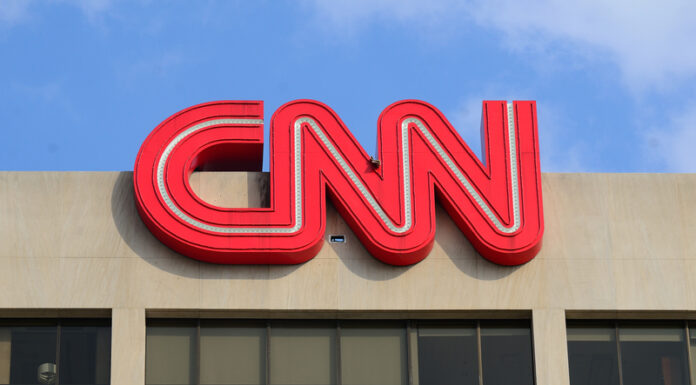CNN International host Richard Quest buried his head in his hands during a live broadcast on Monday, April 7, as he listened to President Donald Trump’s top advisers attempt to defend the administration’s controversial tariff policies that have sent markets tumbling.
The moment occurred during “One World with Zain Asher and Bianna Golodryga” as Quest was subjected to a montage featuring economic adviser Peter Navarro, Treasury Secretary Scott Bessent, and Commerce Secretary Howard Lutnick all trying to reassure the public about tariffs that many analysts blame for the S&P 500’s largest three-day drop since “Black Monday” in 1987.
When the camera cut back to the studio, a clearly distressed Quest had his head buried in his hands, prompting host Zain Asher to comment, “Look at his face, his head buried in his hands, literally!”
“And it’s only Monday,” Golodryga quipped, before Quest launched into a passionate critique of the Trump administration’s economic messaging.
“There doesn’t have to be a recession, says the U.S. treasury secretary. He’s right, there doesn’t have to be a recession!” Quest exclaimed, referencing Bessent’s comments on NBC. “The only problem is, economic circumstances have now been put in place that most Wall Street economists of senior note say are likely to cause a recession.”
Quest pointed to forecasts from major financial institutions that suggest serious economic consequences from the tariffs. Both Goldman Sachs and JPMorgan Chase have raised the likelihood of a recession to 60 percent.
“You want a trade war? This is what it looks like,” Quest added during the broadcast, dismissing the statements from Navarro, Bessent, and Lutnick as “just hyperbole” that failed to acknowledge the “disruption” occurring in markets worldwide.
According to Quest, the reality is that when disruption reaches a certain point, it overwhelms the markets, leading to job losses, a halt in investments, and eventually triggering a recession.
The British broadcaster’s frustration reflects growing concerns among economists and business leaders about the impact of President Trump’s sweeping tariff policies. On April 2, Trump announced a 10% tariff on all imports, with additional country-specific tariffs that began on April 9. The announcement triggered massive market sell-offs, wiping out approximately $6.6 trillion in value before markets closed for the weekend.
China faces particularly severe measures, with tariffs of at least 104% on Chinese goods entering the U.S. The economic uncertainty has led to significant declines across various markets, with the S&P 500 approaching bear market territory.
In response to the high tariff on Chinese imports, China has implemented several countermeasures:
- Increased Tariffs on U.S. Goods: China announced a retaliatory tariff of 84% on all U.S. imports, effective April 10, 2025.
- Blacklisting U.S. Companies: Beijing has blacklisted several American firms, particularly those in defense and technology sectors, restricting their operations within China.
- Export Controls and Regulatory Measures: China has implemented export controls on critical materials and initiated regulatory probes targeting U.S. businesses operating in China.
- Call for Trade Negotiations: Despite these measures, China has expressed a desire to resume trade talks with the U.S., emphasizing the need for dialogue based on equality and mutual respect.
JPMorgan Chase CEO Jamie Dimon has joined the chorus of concern, stating that a recession is a “likely outcome” from what he describes as Trump’s tariff turmoil. Dimon believes the trade war between the U.S. and China is causing financial markets to sell off aggressively, potentially leading to declining consumer sentiment and economic contraction.
Dimon, who has previously supported tariffs, now encourages the U.S. government to negotiate trade deals with partners to mitigate negative effects, warning that market reactions could worsen without progress on trade negotiations.
The impact of tariffs is already being felt in the business community. A recent survey revealed that one in four U.S. businesses has scaled back hiring plans due to the trade war, with tariffs becoming the top concern for chief financial officers. The same percentage of CFOs report cutting their capital spending plans for 2025.
The tariffs are also affecting everyday consumers. During a NewsNight broadcast with Abby Phillip last week, Quest used his own shoe to illustrate the impact on consumer goods. Taking off his shoe, Quest pointed out: “It is made in China… This is going to be 34 percent more expensive. It’s an ordinary shoe bought in a discount store.”
Beyond the U.S., the tariffs are causing ripple effects globally. The UK is likely to experience higher borrowing costs for companies and households, with the Bank of England warning that the tariffs have increased risks to global growth and financial stability.
Countries heavily reliant on exports to the U.S., such as Vietnam and Bangladesh, are expected to be particularly impacted. Some economists warn that a global recession caused by the tariffs could approach the scale of the 2008 financial crisis, featuring higher inflation and persistent unemployment.
The economic uncertainty comes despite strong U.S. job growth in March, just before the implementation of the tariffs. Analysts now suggest those employment figures feel “more dated and backward-looking than usual” given the sharp escalation in trade tensions, with warnings of potential layoffs and weaker consumer and business sentiment in coming months.
President Trump has remained steadfast in his support of the tariffs, recently claiming at a National Republican Congressional Committee dinner that other countries are “kissing my ass” to negotiate tariffs, according to CNN reporting. Trump has also claimed the tariffs are bringing in nearly $2 billion per day in revenue, though fact-checkers have disputed this figure, suggesting the actual increase in customs duties is closer to $200 million per day.








